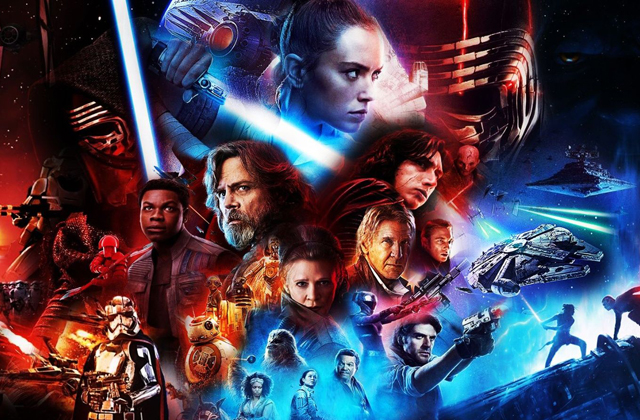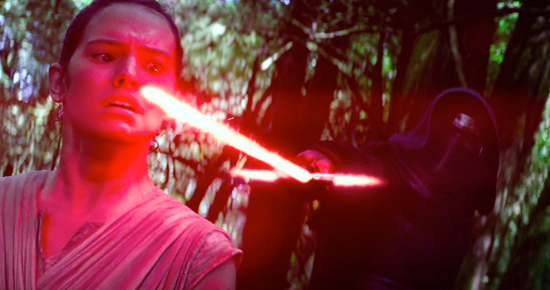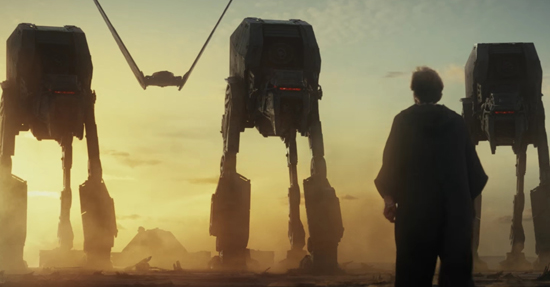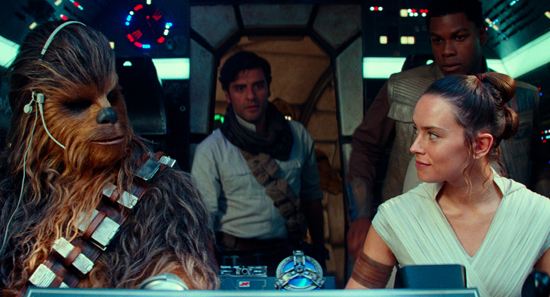
What a ride the Star Wars universe has been on in it’s 40-plus years of existence. When George Lucas wrote out his first draft of his intergalactic space opera back in 1977, I don’t think he ever thought that it would be a movie that would change cinema forever, let alone build it’s own empire. He was just looking to make a movie that would satisfy his own interests; namely making a throwback to the movies that he grew up with. Nevertheless, Star Wars changed everything, and it launched George Lucas into an entirely different path in his life. He stepped away from the director’s chair and instead focused on managing this ever growing movie empire that spawned from the success of Star Wars. He built Industrial Light & Magic (ILM) into an industry leader special effects studio. He helped to put the Bay Area on the map as a film-making destination with his establishment of the Skywalker Ranch compound, and also with his early investment in Pixar Animation. But, it was always the continued influence of Star Wars that fueled George’s many projects thereafter. Eventually, he did return to the director’s chair and expand the Star Wars mythos even more with his prequel trilogy. The results, however, divided the Star Wars fan-base. Older fans saw the prequels as a betrayal, while younger fans embraced these new adventures much in the same way that the past generation had. For Lucas, the movies proved financially successful, but he was also receiving backlash for the first time for making the same kinds of movies he had made all those years before. As a result, Lucas again retreated from directorial duties, and instead focused on maintaining what he had already built before. In time, he managed to win around more goodwill with his efforts to expand the Star Wars universe outside the main saga films with animated series like Star Wars: The Clone Wars as well as with well received video games like Star Wars: Knights of the Old Republic. But, in 2012, Lucas stunned the world by declaring that he was handing the reigns of empire over to a new master.
With a deal valued at just over $4 billion dollars, George Lucas agreed to sell his studio and all of it’s assets over to The Walt Disney Company. Though the sale came as a surprise to many people within the industry, the fact that it was Disney who were behind it was less surprising. Lucas and the Disney Company had collaborated before, mainly on theme park attractions based on Lucasfilm properties. Disneyland won out over other heavy hitters like Universal to become the home of rides based on the Star Wars and Indiana Jones properties, and it was mainly because Lucas himself just believed Disneyland would be a better home for his characters. For nearly 30 years, it was already commonplace to see Star Wars characters represented alongside those of Disney at the parks. Now, with the deal in place, Disney was making all of Star Wars officially a part of the Disney family. But, was Disney just buying Star Wars in order to capitalize on already established products. Of course not. Just like with Marvel, Disney intended to put their newly acquired asset to work, and they did so by announcing that they would be making a whole new series of Star Wars movies. Not only that, but they would be picking up where George had left off in 1983 with the ending of Return of the Jedi. This was exciting news to Star Wars fans across the world, but it also came with a grain of caution. The backlash against the prequels was still fresh in a lot of people’s minds, and many were wondering if making Star Wars without the guidance of George Lucas was even possible. Still, Disney wasted no time, enlisting widely celebrated filmmakers to undertake their reboot of the series, with J.J. Abrams, Rian Johnson, and Colin Treverrow put in charge of what would be the new prequel trilogy. To the delight of many, Disney also managed to talk all the former cast into returning, including Harrison Ford, Mark Hamill and Carrie Fisher. Even ailing Peter Mayhew was going to don the fur once again as Chewbacca for a couple scenes. But, even with all that talent, a lot rested on how audiences would embrace this new era of Star Wars. So, let’s take a look at the completion of the Skywalker Saga with this retrospective of Star Wars’ sequel trilogy. And caution, spoilers ahead.

STAR WARS: EPISODE VII – THE FORCE AWAKENS
Directed by J.J. Abrams
The way you make or break a franchise is in how you approach the way it starts. Some franchises just like to jump out of the gate running, delivering every bit of information we need to know right from the beginning, which unfortunately robs the movie of any mystery. J.J. Abrams rightly assumed that everyone who was going into his seventh chapter of the Star Wars saga was already familiar with the world of this series, so he focused instead on the thing that mattered more; the characters. In a wise gesture to the past success of the franchise, Abrams enlisted Empire Strikes Back (1980) scribe Lawrence Kasdan to help him with the script, and this made a big difference in the end. If there was ever someone who knows this universe as well as George Lucas, it’s Kasdan, and with his help, the script was able to capture that past glory of what made Star Wars so memorable in the first place. The story picks up 30 years after the events of Return of the Jedi, and all that time is perfectly summed up in the succinct opening scroll; Luke Skywalker has vanished, a zealous group known as the First Order have risen out of the ashes of the fallen Empire, and General Leia Organa (Carrie Fisher) is once again leading a rebellion. That’s all we need to know before the movie begins, and the rest of the movie can breeze along. The one major complaint that I hear about The Force Awakens is that it’s too familiar, and it’s hard to argue against that. The movie does, for the most part, play like a retread of A New Hope, almost beat for beat. And yet, J.J. Abrams was able to make that work to his advantage. What people wanted to see was that it was still possible to make a Star Wars movie that felt like a true Star Wars movie, and to the tune of record smashing box office, J.J. proved that it was indeed possible, if a little overly derivative.
What makes The Force Awakens work as well as it does can be found in it’s opening act. Before Abrams starts to drop all the heavy nostalgia nuggets into his film, he devotes the first 30 minutes to establishing the newest characters to the series. In the first act, we meet Poe Dameron, the cocky rebel pilot, Finn, a disillusioned storm trooper ready to defy the First Order, Rey a mysterious, young orphan scavenger on a desolate planet, and Kylo Ren, the First Order’s Sith Lord commander. The stakes are made clear and every new character’s wants and needs are defined very well; with much of the same economic efficiency as George Lucas had in the original film. After all the introductions are made, and we are abe to sympathize with our new protagonists, we finally get our first taste of the series icons, starting with a hilariously casual reveal of the Millennium Falcon. From then on, Abrams lays on the nostalgia pretty thick, but it feels earned at that point. We’ve already grown attached to the new characters, so we’re able to both enjoy the nostalgia points while also remaining invested in this new adventure. Even the most hardened critic will find it difficult not to smile when Han Solo and Chewie reenter the Falcon for the first time in years and with a smile Han says, “Chewie, we’re home.” At the same time, Force Awakens is not afraid to take some chances, primarily with some of the legacy characters. Han Solo meets his end in this film, at the hands of his own son, Kylo Ren, in a extra tragic twist. No matter what, it was crucial for Abrams to put the series on solid footing on it’s first time outside of George Lucas’ control, and he managed to do just that. In particular, he did a marvelous job of establishing the new generation that were going to be the standard bearers of this series, with Daisy Ridley, John Boyega, Oscar Isaac and Adam Driver all delivering stand out performances that both stand on their own, but also do justice to the series that they are in. The only question is, did Abrams play it too safe by repeating much of the same notes as past Star Wars movies, and would it be possible to make a Star Wars movie that felt a great deal different.

STAR WARS: EPISODE VIII – THE LAST JEDI
Directed by Rian Johnson
The table was perfectly set for Rian Johnson (Looper, Knives Out) to pick up where J.J. Abrams left off. Rey, having learned that she is sensitive with the Force, goes off to find Luke Skywalker (Mark Hamill), so that he can train her to be a Jedi. Meanwhile, Leia and the rebel force continue their offensive against the First Order, with the Supreme Leader Snoke (Andy Serkis) taking on a more active role after the destruction of the Starkiller Base. So, what does Johnson do with the narrative that’s been laid out for him; why he completely upends everything we expect we know about Star Wars. Johnson took this opportunity to rethink what a Star Wars narrative could actually be. Here, we have a Jedi Master in Luke Skywalker who has lost his faith and wishes to live in solitude. Snoke, who was established to be a new big bad for the Star Wars universe, is quickly tricked and disposed of by his own apprentice; Kylo Ren. Poe Dameron learns that it’s to the best interest of the rebellion that you shouldn’t try to take on the First Order alone, and instead fight to protect the things you love instead. The Last Jedi takes every expectation that we have about Star Wars, and flips it on it’s head, raising some very provocative questions. Unfortunately for Johnson, this was not the movie that many Star Wars fans were wanting or expecting. Of all the movies in the Star Wars franchise, this is the most polarizing one, with people falling into either the loved it or hated it camps, with almost no in-between. For me, I actually fall into the former. The Last Jedi is not my favorite film in the franchise, but it’s the one that I admire the most, because it took the boldest chances. The moment that Luke tosses his lightsaber over his shoulder like it’s trash was when I knew we were in for a whole different Star Wars movie, and I was all for it. For a series like Star Wars to grow, it needed to redefine itself, or otherwise it would just keep repeating the same notes over and over again. But, alas, a lot of vocal critics were not pleased with this choice.
The heart of The Last Jedi is found in it’s portrayal of Rey’s growth as a character. We learn that Rey’s path towards becoming a Jedi is not going to be as easy of a road as it was for Luke. Luke recognizes the dangers of tapping too deep into the powers of the Force, and that’s what has made him disillusioned for all these years. He sees the potential for Rey to be drawn to the Dark Side, just like Kylo Ren and Darth Vader had been, and more troubling is just how unchecked her powers are and how her desire for purpose is fueling that dangerous road towards the darkness. Many critics have found Rey to be a “mary sue,” but in Johnson’s narrative, he makes that point as the danger always lies in the fact that Rey is too powerful for her own good, and her naivete could drive her more easily towards the Dark Side, making her a potentially threatening presence. It’s that fine line between heroism and villainy that Johnson wanted to explore, and show that any one of us could also mistake purity as security. Rey’s search for identity endangers both herself and those she loves, and the fact that she steps back and accepts that heroism is more about selflessness than glory, she ultimately manages to distinguish herself as a hero. In turn, Luke finds a way to believe in himself again. Though Johnson does flip the narrative around, he does leave us with Luke Skywalker once again facing down the Empire by himself, only in a self-sacrificing way that doesn’t stop the bad guys so much as it gives the good guys a fighting chance. Luke learns to fight for what he loves, and that is where the heart of the movie lies. At the same time, The Last Jedi may also be the most gorgeously shot movie in the entire series, with the contrasting red and white’s of the Planet Crait being a particular standout. Sure, The Last Jedi is divisive and challenges everything we believe about the universe of Star Wars, but honestly, it’s the change that Star Wars needed and I for one welcomed it. With the bold choices made by this movie, you would think that the final chapter would carry it forward and continue to push the series to newer heights, right? Right?

STAR WARS: EPISODE IX – THE RISE OF SKYWALKER
Directed by J.J. Abrams
From the get go, The Rise of Skywalker was destined to be the problem child of this new trilogy. Colin Treverrow was let go from the project right after delivering his first draft of the screenplay. At the same time, Lucasfilm also removed a number of other directors from their selective projects; most notoriously Phil Lord and Christopher Miller, who were nearly two-thirds of the way through shooting their stand alone film, Solo: A Star Wars Story (2018), and also had to do numerous re-shoots in order to salvage the troubled production of Rogue One (2016). The backlash over The Last Jedi didn’t help, and it seemed like Lucasfilm CEO Kathleen Kennedy was doing a lot of last minute re-thinking that was shaking up the Star Wars universe in a bad way. J.J. Abrams was brought back to salvage the Episode IX project, but instead of working with Treverrow’s own treatment, Abrams elected to start from scratch, while at the same time, meeting the same Christmas 2019 release date without delay. This was a recipe for disaster, as it gave Abrams so little time to get the movie done right, but he was kind of stuck. That release date was set, because it had to line up with the opening of Star Wars: Galaxy’s Edge in the parks and the premiere of The Mandalorian on Disney+. As a result, The Rise of Skywalker ended up being a mess. It might have not been so bad if this was any average sequel, but by being a closing chapter in a saga that has been strong for forty years, as well as the culmination of the story delivered through The Force Awakens and The Last Jedi, it made the end result especially disappointing to long time fans. It wasn’t as polarizing as The Last Jedi as this time almost everyone didn’t like Rise of Skywalker, including myself. Is it the worst Star Wars film; no. I will say that I never found myself bored watching the movie, like I had while watching Attack of the Clones. But, Skywalker may be the most disappointing of all the Star Wars movies because of all the blown potential.
It’s clear that J.J. Abrams and Rian Johnson are two entirely different filmmakers, as their approaches to the same story take wildly different trajectories. But as Johnson’s subversion of tropes worked well after Abrams infusion of nostalgia, it doesn’t make much sense for Abrams to re-contextualize everything Johnson laid on the table in order to better suit his vision. I almost believe that it might have been better to have left Colin Treverrow on to help the series flow better with a different vision for every movie, even if Treverrow’s script would’ve been messy in it’s own right. The problem begins from the very start, as Abrams shoe-horns the presence of Emporer Palpatine into the narrative, which is indicated no where in any of the previous two films. I do acknowledge that it is nice to see veteran actor Ian McDiarmid back in the role that he’s played ever since Return of the Jedi, but it makes no sense for Palpatine to re-enter the story at this point in time. It takes away much needed time to further establish the growth of our cast of characters in order to change the stakes once again. It’s a plot reset that cheats the narrative flow of the new trilogy and feels like an act of desperation on Lucasfilm’s part; hoping to bring disgruntled fans back to the flock. Plot points are completely dropped and nothing feels earned. The movie also has the uncomfortable aspect of using stock footage of Carrie Fisher in order to complete her role as Leia, after her untimely death before the release of The Last Jedi. J.J. does the best he can, but her presence here feels less graceful than it should be, and it might have been better served to have had Leia pass away off screen. The biggest insult to the fans is that the 9 film arc of this story only led up to something so hollow and manufactured. At least The Last Jedi was trying to say something. The goal of The Rise of Skywalker was to please everybody, and in the end it pleased no one. Look no further than the completely insulting final kiss between Rey and Kylo Ren to see just how shamelessly pandering this movie was to being a manufactured product rather than a movie worth celebrating.
When all was said and done, was Disney’s reboot of the Star Wars’ Skywalker Saga a success or a failure. It depends on who you ask. Some would say that it betrayed the fundamentals of the series, while other believe that it took Star Wars into bold, brave new territory. Regardless, I don’t think anyone can safely say that Disney stuck the landing. Their stewardship of the Star Wars universe certainly got off on a rocky start, but the future still remains bright. The Mandalorian received almost universal praise upon release, and there are still plans for many more stand-alone Star Wars extended universe projects on the horizon. But the mixed results of the sequel trilogy may leave a bad taste in the mouths of several fans, because this was the saga on which the foundations of the universe were built upon. It involved the original characters, with the performers of that trilogy delivering their swan songs as Han, Luke and Leia all meet their ends in this new trilogy. There is still a lot of good things I can say. The performances are strong throughout the trilogy, even with the lackluster script they had to work with on Skywalker. Adam Driver and Daisy Ridley in particular delivered truly iconic performances as Kylo Ren and Rey resepecively, and they remain two of the past decades greatest cinematic characters, as I stated in my lists here and here. Though Poe, Finn, and especially Rose Tico (Kelly Marie Tran) get pushed to the sidelines in Rise of Skywalker, their selective actors’ performances remain strong right to the end. And visually, each of the movies still maintain that great sense of wonder that every Star Wars movie has, as we jump from one world to the next, each with it’s own identity. Disney certainly wants to see Star Wars live on forever; why else would they spend billions on it. Hopefully the lesson they take from this is that they should never launch a trilogy without a unifying vision from the very outset. By giving too much leeway to each individual director, they may have undermined the trilogy from the outset. Even still, I enjoy most of this new trilogy, even parts of The Rise of Skywalker, and that’s mainly because I liked the different ways that Disney and Lucasfilm set out to expand this universe. That’s the genius of George Lucas’s creation in the end; it’s endless possibilities. Disney may need more time to get it completely right, but I think that Lucas put his universe in the right hands, and I have no doubt the Force will be strong with Star Wars in the decades ahead.